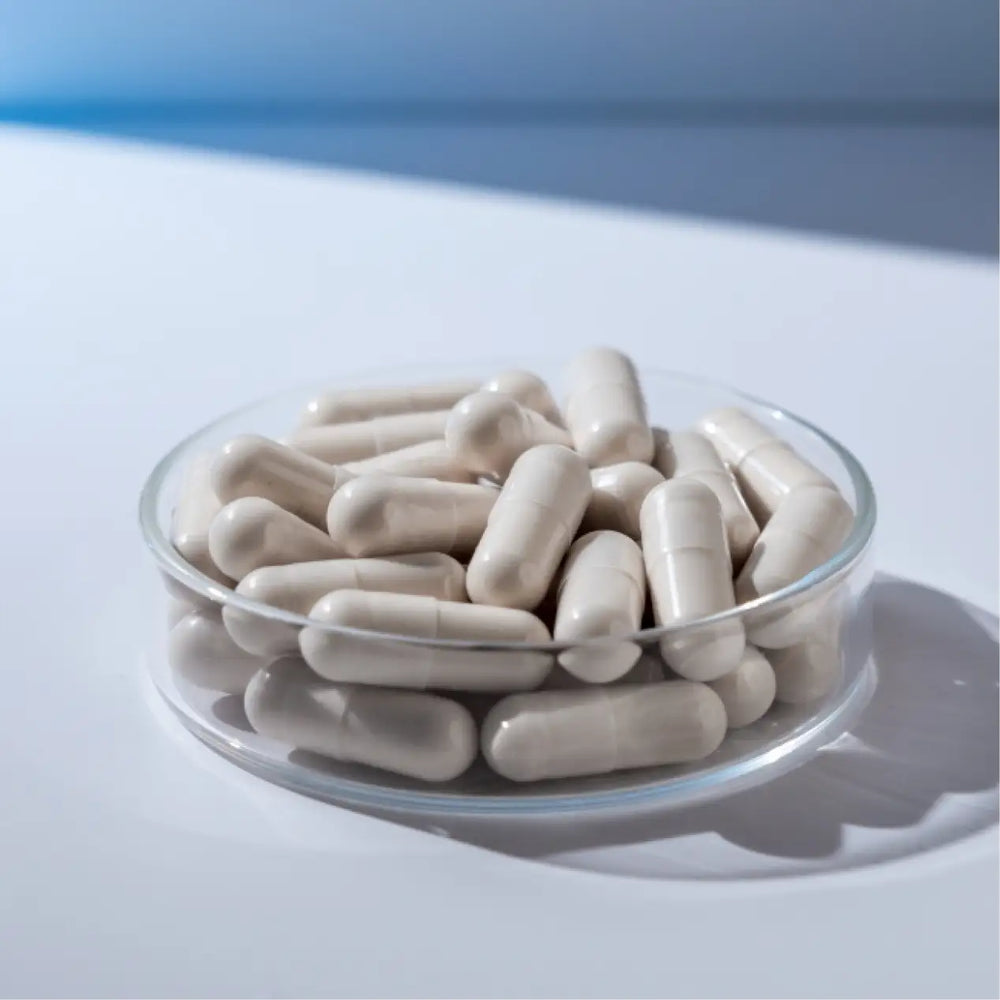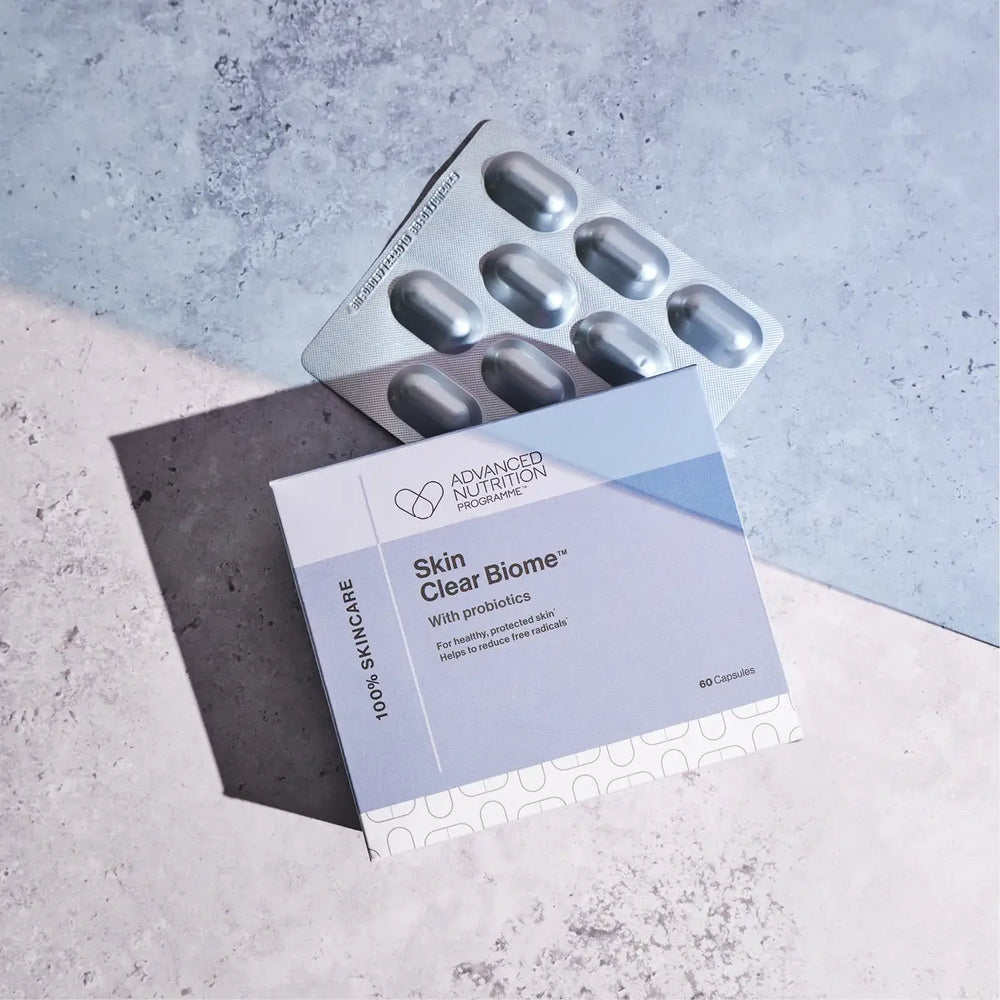The countless benefits of Vitamin C for Skin
Posted on September 22 2022
We know that vitamin C is absolutely essential for general health, and if we become depleted, it can very quickly lead to illness. Not only is vitamin C crucial for everyday function, but it also has some astounding benefits on the skin. In fact, most skincare lovers are already familiar with the brightening, protective benefits of vitamin C for skin. But there is so much more to this humble micronutrient than protection and glow. Here are just some of the reasons why vitamin C should be among your list of favourite skin-loving ingredients, and how you can maximise its benefits with both topical skincare and internal supplementation such as Advanced Nutrition Programme’s Skin Vit C.
Forms of Vitamin C
The first point worth noting is that vitamin C comes in many forms, or derivatives. The most common is L-Ascorbic Acid, which is used for both oral supplements and for skincare. Various other forms used in skincare have been incorporated for various reasons. Depending on how the product has been formulated, such as the quantity of vitamin C used or the encapsulation system, very sensitive skin can sometimes react adversely to Ascorbic Acid. As such, some skincare brands may choose to formulate with other vitamin C derivatives, such as Tetrahexyldecyl Ascorbate. Other factors influencing the choice of vitamin C type used in a product include how acidic the formulation is designed to be, or whether it should be water-soluble or oil-soluble.
So, as you can see, the variety of vitamin C alone can be complex. This is because vitamin Cs are potent and quite reactive, molecularly-speaking. This is why choosing the right type of topical vitamin C for your skin needs and level of sensitivity is crucial. However, when it comes to oral vitamins and beauty supplements, this does not apply internally. So, you can rest assured that Ascorbic Acid is effective for your dietary and supplementation intake.

Collagen production
Our bodies are home to countless different types of collagen, which is a major component of our cartilage, connective tissue, and skin. Abundant Type 1 collagen in the skin is essential for a complexion that is youthful, plump, and bouncy, as the collagen network acts as a support scaffold that perks the skin up from below. Once this collagen scaffold degrades with time, and production of new collagen slows down, this will manifest on the skin’s surface as sagging, wrinkles, and loss of volume (hollowing). Produced by fibroblast cells, collagen requires several key micronutrients during its production process - and one of these is vitamin C. So, in order for collagen production to be optimal, you must be meeting your daily recommended intake of vitamin C.
Stress modulation
During stress, a complex cascade of hormones are produced, including cortisol, which over a long period can have harmful effects on cellular structure and function, cognitive ability, and digestion, just to name a few. Vitamin C it used during the processing of this stress response, so even if you are achieving the daily recommended dosage of dietary vitamin C, those experiencing chronic stress may be depleted.
Pigmentation reduction
Pigment in the skin such as age spots, melasma and freckles are formed by melanosome cells, whose activity is triggered by ultraviolet radiation, hormonal fluctuations, and even by inflammation. This is why sun exposure, pregnancy, menopause, injuries or even clinical skin treatments designed to induce micro-trauma can all be responsible for triggering pigmentation. Melanosome cells produce pigment, called melanin, which they then deposit into keratinocyte cells of the skin.
Using vitamin C-based topical skincare can help reduce this pigment production and transfer process, thereby reducing pigmentation. And so too can nutritional vitamin C, especially when used in combination with topical solutions.
When it comes to clinical skin treatments that induce micro-traumas, this is exactly why it is imperative that clients prep their skin using pigment inhibitors for several weeks prior to their treatment, reducing the risk of post-inflammatory hyperpigmentation. Using topical skincare in addition to vitamin C-based beauty supplements can amplify this effect even more greatly, while also bolstering skin strength and quality. This approach will help to produce even greater results and quicker healing post-treatment as well.

Antioxidant protection
Perhaps one of vitamin C’s most renowned benefits is its antioxidant protection. A natural bi-product of our every-day cellular function is the production of free radicals. However, these electron-scavenging molecules roam the body destabilising other molecules and, as a result, cause damage and destruction of cell membranes, lipids, and DNA. Therefore, antioxidants are required to limit this damage. Antioxidants have the ability to donate an electron to these free radicals, thereby stabilising them and preventing them from harm.
Generally, there is a healthy balance of antioxidants in the body, received from our everyday diet. However, when we have too many free radicals and not enough antioxidants to neutralise them, the body enters a state of ‘oxidative stress’. This can lead to inflammation and inflammatory conditions, systemically or on the skin, as well as alteration of DNA expressions, and premature ageing. This is why antioxidants are crucial for overall health as well as a healthy, glowing complexion. This is particularly true for those prone to greater free radical production. Factors known to increase our production of free radicals include pollution exposure, consumption of pesticides and artificial preservatives, chronic or prolonged stress, smoking, excess alcohol, and poor diet, among other things.
Enhanced sun protection
Going hand in hand with its pigment-reducing effects, vitamin C has shown throughout countless studies to enhance the effects of sun protection agents. UV exposure is one of the most significant stimulants of melanosome activity, so optimal sun protection should be the primary strategy for anyone with pigmentation concerns. Pairing sunscreen with adequate vitamin C intake is therefore recommended, not just for pigmentation, but for general prevention of signs of ageing.
A brighter, stronger complexion
Aside from its aforementioned benefits of pigmentation prevention, sun protection, and collagen boosting abilities, Vitamin C is already loved for its visible results on the skin. It has a wonderful energising, brightening effect, aiding in cellular function and skin turnover. This combined with pigment reduction, and collagen stimulation, makes for firmer, even-toned, more youthful skin that glows from within.
It also has a wonderful strengthening effect, which can aid in diffusing redness caused by delicate vessels. When blood vessel walls are thin and delicate (caused either by natural ageing or genetics) they can often be visible through the skin’s surface, making one’s complexion appear pink or red, even when other signs of sensitivity are not present. Vitamin C can aid in strengthening capillary walls, and when combined with a boost in collagen throughout the dermis, vessels are stronger and less apparent through the skin’s surface, thereby helping to reduce redness. This also reduces the incidence of broken capillaries, ie. when a tiny delicate blood vessel bursts in the skin and is visible through the surface as a small red lesion. Those prone to sensitivity and reactions to topical vitamin C ingredients may benefit instead from nutritional sources of vitamin C, in addition to ingredients shown to reduce redness and inflammation, such as zinc.
There are countless reasons to love vitamin C. Not only can it help to address specific skin conditions such as pigmentation, redness, and generalised ageing, but can significantly improve overall skin health through the optimisation of cellular health and function. Advanced Nutrition Programme has been designed to help skin be the very best it can be through an inside-out approach; using scientifically backed ingredients from within, in combination with your own quality skincare of choice.
Our Skin Vit C has been formulated with bio-available Ascorbic Acid to provide all the aforementioned benefits, in conjunction with additional micronutrients. Zinc has been added to provide anti-inflammatory, skin-healing properties for the ultimate healing and age-defying benefits. For unparalleled vitamin C support, Skin Vit C combines Ascorbic Acid with Acerola Cherry, a nutrient-dense food source containing one of the highest natural sources of vitamin C possible. The end result? Better collagen production, reduced pigment, a brighter more even skin tone, a stronger capillary network, and delayed signs of ageing through powerful antioxidant protection. Click here to find out more about Skin Vit C.
Words by Mala McAlpin.
100% Skincare Benefits

Skin Consultation
To begin your 100% skincare journey today, complete the online consultation quiz, and we will suggest supplements to assist in improving skin health, personalising your supplements to address your key skin concerns.

Skin Rewards
Skin Rewards is free to join, and you'll receive 50 points as our welcome gift. The Skin Rewards Program has been created for skin lovers like you, offering exclusive benefits for purchases made exclusively at Advanced Nutrition Programme.

Product Subscription
Did you know that we offer subscription program? These allow you to enjoy the convenience of auto-shipment and discounted product rates. Our subscription plans are fully flexible with no fixed contract.

